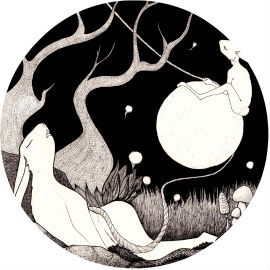I went to see her straight from the airport. (Was I, then, a good son, or only the semblance of one, going through the motions, performing goodness because, perhaps, there was someone up in the carpark above me, watching me swim back and forth, back and forth?) I knew my mother’s health had deteriorated. I knew I would find her changed, but she was still my mother. I expected her to take as long declining as I had taken to grow up. When I reached the house and went inside, she was lying in a hospital bed: the kind that can be raised or lowered, at one end or another, arranging the patient without any need to touch them. Her skin was pale and holy, with that secret sheen I associated with death. Her breath, when I leaned in to kiss her cheek, smelled excessively sweet: a dark, thickly-layered perfume of rot and apples. The radio was still on, turned low and tuned to the same channel as always. They were playing Isabelle Faust’s thoughtful and carefully balanced performance of Bach’s D minor Chaconne: my mother had always hated Bach.
She told me, very precisely, and in a way that made me think she had memorised what she would say before I arrived, what she had thought of my latest translation. It took great effort for us both to attend to the particulars. She told me again the story of Flaubert’s 80-year-old niece, Caroline Commanville, quoting the last line of his Herodias to Willa Cather: Comme elle était très lourde, ils la portaient al-ter-na-tive-ment. She told me to attend to how that final adverb staggers on the tongue, and in the mouth, like the hurried footsteps of John’s disciples bearing away their prophet’s severed head. “Flaubert,” she said, closing her eyes momentarily to encounter and turn back the pain that assailed her, “he understood la mélodie de la phrase. As you, it seems, do not.”

No Comments